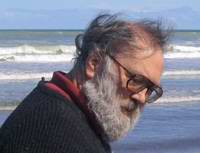Scene: On Monaro.
Dramatis Personae
Shock-headed blackfellow,
Boy, (on a pony).
Snowflakes are falling
Gentle and slow.
Youngster says, "Frying Pan,
What makes it snow?"
Frying Pan, confident,
makes the reply–
"Shake 'im big flour bag
Up in the sky!"
"What! When there's miles of it?
Surely that's brag.
Who is there strong enough
Shake such a bag?"
"What parson tellin' you,
Ole Mr Dodd,
Tell you in Sunday School?
Big pfeller God!
Him drive 'im bullock dray,
Then thunder go;
Him shake 'im flour bag–
Tumble down snow!"
(A.B. Patterson)
Even when the above was written, there was an emerging awareness of the sophistication of aboriginal theology, though there were few white Australians ever admitted to its secrets. Even so, it pleased Patterson's audience to read of this simple and ignorant "shock headed blackfellow."
I preface these notes with the poem because in a number of ways I relate to Frying Pan. I am setting out to forge a systematic personal theology and I am arrogant enough to attempt it without formal training, or even an understanding of what many fine intellects and spirits have achieved before me.
What is more, I am writing of my own spiritual experience. I am writing about phenomena that are personal and real to me. It seems to me pointless to speculate on matters that I cannot yet relate to my own experience. Like the notional Frying Pan, the limits of my experience will be obvious.
-o0o-
God is Love
God is Love. Love is God. What is not God is not Love. What is not Love is not God. If you have experienced Love you have experienced God. If there is an ultimate, creative force or energy or directing, organising principle in the universe, a God with a capital G, it is that of Love
For me, Love is the central feature of my theology. As I explore and reflect on my experience of it, my life becomes increasingly rich and increasingly satisfying.
For me, it seems appropriate to understand it always in relation to its polar opposite, fear/anger.
When I Love
When I love somebody or something, I am completely open to them. I feel perfectly safe. I am deeply and fully aware of the nature of that which I love. I am able to respond richly and fully and unconstrainedly and joyously.
I have no requirement of what I love that it change, the better to serve my purpose. I experience it as a complete example of itself.
Created in His Own Image
Genesis tells of a God who created us in his own image.
When I experience Love, I feel most myself, least divided. I feel most complete, most satisfied, most unified, most together, most at peace.
I believe that we are most truly ourselves when we are vehicles for Love.
Perfect Love Casteth Out All Fear
And vice versa. When we are afraid, we cannot be ourselves. We cannot allow anything we fear to be itself. Instead of love, issues of conformity, security, power and control take over — Fight or Flight.
Jesus was well aware of this. His disciples and followers believed he was the Messiah and the Messiah for them was a figure of awesome political power who would restore to the Jewish people their rightful place among nations. It has been argued that Judas' motive in betraying Christ was to force his hand and oblige him to assert his power, strike his enemies down and convince the sceptics, or be himself destroyed. Christ kept putting the path of love before them in as many ways as he could. They could only conceive the Messiah in terms of Power and Control.
And these, I believe are the very antithesis of love.
Here and Now
Loving occurs in a kind of eternal present, our awareness changing from moment to moment, yet always complete, always responsive.
Various gurus of the age of therapy have spoken of this state. The Gestalt school called, it as I have done, the Here and Now. Bandler and Grinder, the N.L.P. authors spoke of it as Uptime, a form of heightened awareness and responsiveness, a highly sophisticated feedback loop which bypassed conscious thought processes.
I believe it is in this state of awareness that most useful therapeutic change is initiated, where habits are re-evaluated and updated.
Sin and the Knowledge of Good and Evil
I believe that Sin is any behaviour or state which separates us from God, from our Loving, from our true selves.
It is, effectively, any condition other than the Here and Now.
It is any condition in which we believe that we know how something should be or should not be, should have been or should not have been, and seek to control or manipulate it into something other than what is right now. Loving implies acceptance.
In the Bible, it is the knowledge of good and evil, the eating rather than the actual theft of the fruit, that causes Adam and Eve to be cast forth from the Garden of Eden.



